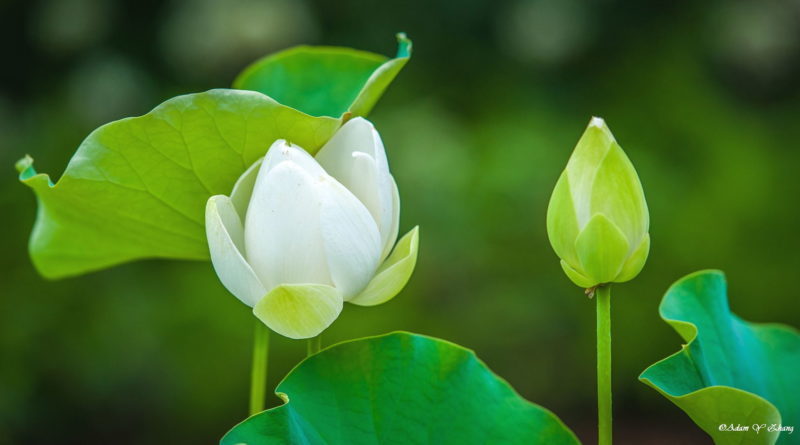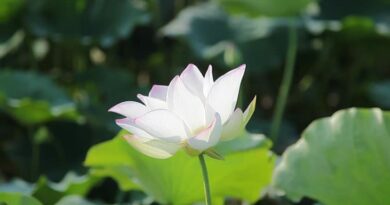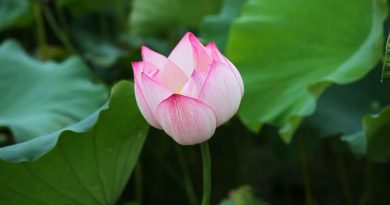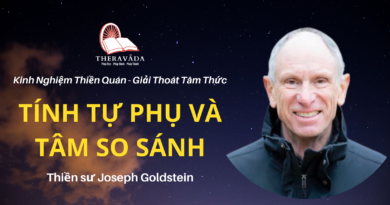DHAMMA PADETHA – 4. A MODEL OF GOOD AND BAD
DHAMMA PADETHA – A MODEL OF GOOD AND BAD
A person has good and bad characteristics, just as weeds are removed from a pond and water is drawn, so also discard the bad and take the good.
During the life time of Lord Buddha, there was a girl bown for her bad and good reputation. Her name was Khujjuttara, a combination of two words: Khujja and Uttara. Khujja, means hunchback and Uttara, was her original name. A hunchback since birth and was known as Khujjuttara.
Khujjuttara was Queen Samavati’s maid, a flower-buyer. King Udena gave Queen Samavati eight coins every day to buy flowers. And the Queen gave Khujjuttara eight coins to buy flowers. Whereupon, Khujjuttara took four coins for herself and bought only four coins worth of flowers and presented them to Queen Samavati.
One day, the flower seller, Sumana offered alms-food to the Lord Buddha and Sangha at the house. Sumana, invited Khujjuttara to listen to the appreciative expression (anumodana dhamma). Khujjuttara listened very attentively and respectfully so as to memorize every word. While listening she meditated penetratively and thus became stream-winner (sotapanna) at the end of the discourse.
At the end of the dhamma discourse, she bought all eight coins worth of flowers and presented them to Queen Samavati. Because the flowers were double the usual amount, Queen Samavati asked Khujjuttara whether King Udena had given her eight coins more as there were more flowers. Khujjuttara answered in the negative and that flowers were eight coins worth that day. On previous days, she had taken four coins for herself and had bought only four coins worth of flowers. She answered truthfully. Queen Snmavati was amazed and enquired why she did not steal and tell lies that day Khujjuttara responded, she could not steal or tell lies because she had listened to the Lord Buddha’s discourse that day.
Queen Samavati thought Lord Buddha’s Teachings have so much power and was full of reverence and longed to listen to the dhamma. Thus, she asked Khujjuttara if she could repeat the discourse she had listened to, Khujjuttark. answered that she could. She was given good clothes to wear and a respectable place from which to relate the dhamma discourse.
Queen Samavati and five hundred attendants became sotapanna at the end of the discourse. After becoming sotapanna they desired more and more to listen to the Teachings of Lord Buddha. Hence, they sent Khujjuttara wherever Lord Buddha gave dhamma discourse and then listened to Khujjuttara again.
Because Khujjuttara listened to the dhamma discourse every time and related to Samavati and five hundred attendants, she learnt the ‘Three Pitakas’ without being taught but only through listening.
Lord Buddha, in giving the highest title to lay women, Khujjuttara was given the highest honour, the pre-eminent position (etadagga), in being skilful and learned in the Pitakas. Thus after receiving the highest honour, Khujjuttara became well-known in Lord Buddha’s sasana. One day, some monks asked Lord Buddha: Oh Lord!
(1) Why is Khujjuttara a hunchback?
(2) Why can she learn the Three Pitakas just by listening?
(3) Why did she become a sotapanna so quickly while listening to the dhamma discourse?
(4) Why did she become a maid in the life she is to attain noble dhamma.
The Lord Buddha replied in the following way:
Khujjuttara-to-be was a maid at the palace of King Brahmadatta at Baranasi before the life time of Gotama Buddha, after the Enlightenment of Kassapa Buddha. Lord Buddha went on relating Khujjuttara’s past lives.
(1) Once eight Silent Buddhas (Pacceka Buddhas) in cluding one hunchback came to the palace of King Brahmadatta for alms- food. The maids including Khujjuttara put rice in golden bowls and wearing red shawls on their shoulders, offered alms-food.
When they had finished offering, Khujjuttara held the golden bowl as the alms-bowl, wore the red shawl like a robe, went forward and mimicked the hunch-back Pacceka Buddha and made fun so that everyone laughed.
That is why, because she had made fun of the Pacceka Buddha, she became a hunchback from birth.
(2) The reason why she was so intelligent was as follows: One day when the eight Pacceka Buddhas came to the palace for alms-food, the alms bowls were full, and because they were hot, the Pacceka Buddhas held the bowls with one hand and another, the right hand and the left hand. When Khujjuttara saw this, she at once took off her eight ivory bangles and offered them to the Pacceka Buddhas to serve as alms bowl stands so as to alleviate the heat.
Thus because she was quick-witted and offered the ivory bangles to alleviate the heat from the hands of Pacceka Buddhas, in the present life she became very intelligent and learnt the Three Pitakas while listening to the dhamma discourse of the Lord Buddha.
(3) Why Khujjuttara became a sotapanna rapidly is because when Pacceka Buddhas came to the palace she performed the necessary duties respectfully. Because of this merit she became a sotapanna while listening to the Lord Buddha’s dhamma discourse at the offering of alms-food ceremony, by Sumana, the flower seller.
(4) Why Khujjuttara became a maid. During the time of Kassapa Buddha, Khujjuttara-to-be was a rich man’s daughter at Baranasi. One evening she was beautifying herself in front of a big mirror. At that time a Holy or liberated female medicant (arahanta bhikkhuni), who was friendly with her came to her place.
The rich man’s daughter asked the arahanta bhikkhuni to fetch some of her cosmetics. The arahanta bhikkhuni thought to herself. If I don’t get the things she asked for, she will be angry and bear a grudge with the result that she will go to realms of continuous suffering (niraya). If I carry out the task she will become a servant for five hundred existances.
Out of these two kinds of bad results, to be a servant would be better than to go to niraya. Thus thinking she did the things as bidden by the rich man’s daughter.
The Lord Buddha discoursed that because Khujjuttara had asked a respectable arahanta bhikkhuni to do things she became a servant for five hundred existences.
(Dhammapadattha 1/44)
To sum it up, Khujjuttara.
(1) was a hunchback from birth because of making fun of a Pacceka Buddha who was a hunchback;
(2) became servant girl for five hundred lives because she made an arahanta bhilckhuni do things for her; (These are bad conducts which should be avoided).
(3) learned the Three Pitakas just by listening was the effect of offering immediately ivory bangles to serve as alms bowl stands, immediately alleviating the heat from the hands of Pacceka Buddhas; and
(4) becoming a sotapanna while, listening to the dhamma discourse was the benefit of serving the Pacceka Buddhas respectfully. (They are good conducts which should be copied).
Motto: Avoid bad deeds, carry out good deeds.








